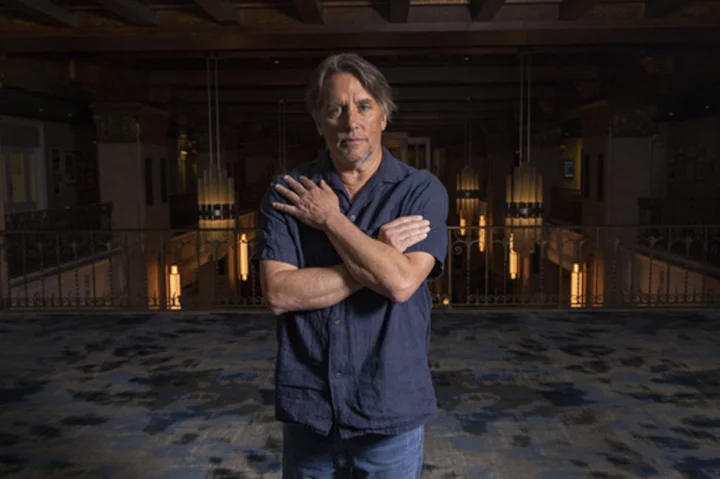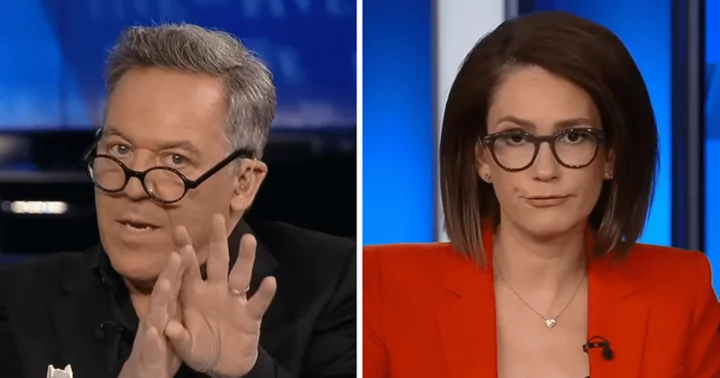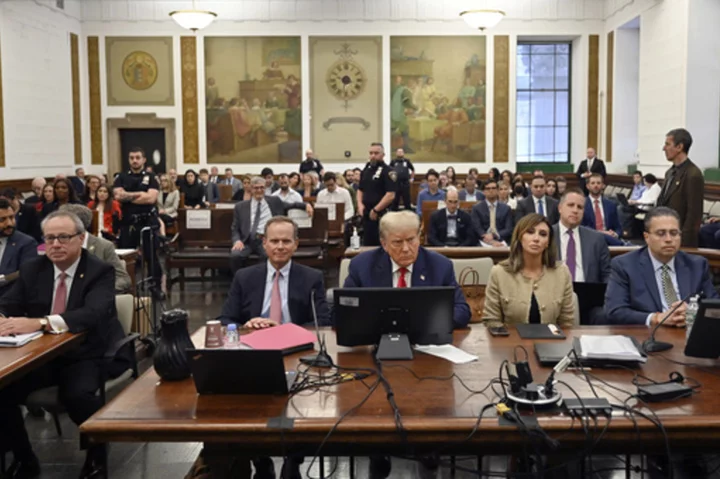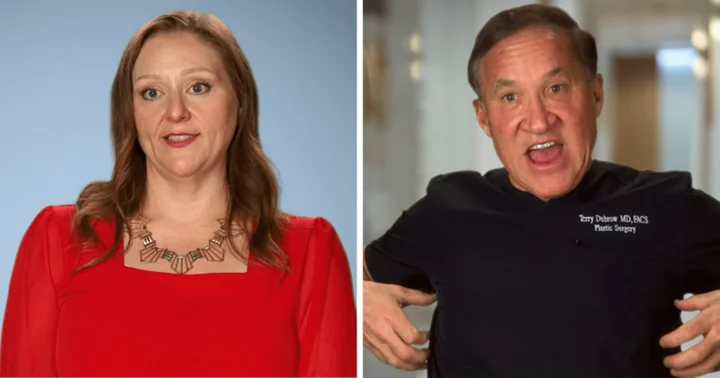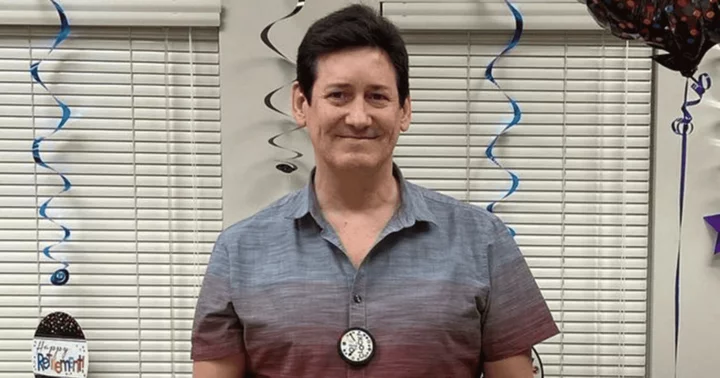TORONTO (AP) — There's been no shortage of hit-man movies at film festivals this fall. You could line them up on a rooftop somewhere, each with their sniper rifles aimed out at audiences: David Fincher's “The Killer,” Michael Keaton's “Knox Goes Away," Harmony Korine's “Aggro Dr1ft.”
But the one that has most resonated — killed, you might say — has been a gentler, funnier take on the genre that says right up front: The hired hit man is a Hollywood myth.
Richard Linklater's “Hit Man " stars Glen Powell as Gary Johnson, a real-life guy who worked for the police as a fake hit man in sting operations to catch would-be murders looking for someone to do their dirty work.
The film takes Johnson's true story and has some fun with it. Gary, thrust into his faux-hit-man role, dons increasingly colorful personas and finds himself in an especially tricky conundrum of selfhood after falling for a wife (Adria Arjona) who wants her husband dead.
The film, which played at both the Venice and Toronto festivals, is an extremely entertaining showcase for the charismatic Powell, the “Top Gun: Maverick” star who co-wrote the script with Linklater.
For Linklater, the 63-year-old director of “Boyhood,” “Dazed and Confused” and “Before Sunset,” “Hit Man” is a typically existentialist film but playfully twisted into a genre-bending noir screwball. Linklater also made the film without a distributor. “Hit Man” is for sale at TIFF, and — given the response — may be the hottest property at the festival.
“It used to be the head of studio would sit down with you, talk, maybe say, ‘I think you’ve got the movie in you. Let’s do it.’ Now, they don't even want to hear from you. You’re up against algorithms and marketing in advance,” says Linklater. “So it was kind of great to go: ‘Let’s just make the movie and bet on ourselves.’”
___
AP: Around your Venice premiere, you said an era of filmmaking was “gone with the wind — or gone with the algorithm.” Is it that bleak?
LINKLATER: I’m a very optimistic person. It’s an optimistic business. It’s a good time to be a filmmaker. I’m not a pessimist by nature. But you have to acknowledge changing times. I’ve seen it change over the years, we all have. My thing is trying to get outside our little insular world. The attack is on human consciousness. It has a formidable opponent in something grabbing our brains and grabbing our attention.
AP: That idea was present in your last film, the animated “Apollo 10 1/2” for Netflix, which fondly recalled a less structured, pre-digital upbringing.
LINKLATER: Yeah, it was kind of an analog, free-range childhood where you really had to make your own fun. Nothing was catered to you. There were very few movies or TV shows that catered to kids. You find your way in. They weren’t just spoon-feeding you. They saw kids as a nuisance or a thing to be put up with, not such a market.
AP: The question of how much people change seems to hover over your films. “Boyhood,” filmed over an 12-year period, seemed designed to measure change in your actors.
LINKLATER: Yeah, I think so. Identity or the development of self. It’s hard to inject that into a narrative. This one, it wasn’t so much in the article I read for “Hit Man” in 2001. It’s really more in the flight of fancy part. I was always in the school – they talk about it in “Before Sunset” – saying you can change but you have your set points. I’ve always been on that. I’m as happy as I can be given my set points. I had more recently read stuff that said you can change quite a bit. But can you really tweak up that dial? I would like to be different.
AP: How so?
LINKLATER: Everything you say, you can always follow with, “Then I wouldn’t be me.” But I wish I enjoyed things that other people seem to enjoy so much.
AP: Like what?
LINKLATER: Oh, I don’t know. The big premiere of your movie. (Laughs) Going to awards show. Dressing up. Being on. I’d really rather be watching a movie or reading. I have the opposite of FOMO. I don’t really want to be anywhere. (Laughs)
AP: Your films have a rare amiability and gentleness to them. How does that get filtered in?
LINKLATER: If you take things really serious or it’s a big deal, then it’s a big deal in your film. I don’t really take anything too seriously. I’m kind of like, “Eh.” I just can’t do certain things with a straight face. It’s all stupid. As an old-school existentialist, I just go through life with a certain detached, fun, irony. Engaged. I care about a lot of things. But I’m not that invested in outcomes. I don’t believe mostly in fictional plotting. That’s why it was interesting to be a little more plotty, to be more in some genres I’m mashing up. Plotting I’ve always said is just fake. It’s not how life works. We don’t have plot-driven lives. We have character-driven lives.
AP: Here, you're kind of mocking the idea of one of Hollywood's favorite plots.
LINKLATER: I’ve had to talk about this with the movie now. “Hit men don’t exist?” Of course they don’t exist. Do the math. Do you ever hear about hit men getting arrested? They don’t exist at the retail level. The notion that someone you’ve never met who’s this icy professional you meet for five minutes is going to risk the death penalty. (Laughs) I think as a culture we have to believe in it. We enjoy believing in it.
AP: Could you tell Powell had something special when you cast him at 14-year-old for a small role in “Fast Food Nation”? The real revelation was “Everybody Wants Some!!”
LINKLATER: That was the big leap. For “Fast Food Nation,” I mean, I cast him out of hundreds of kids. I went: “That guy’s kind of interesting to play this small part. There’s something about that kid.” But it was when he came back on “Everybody Wants Some!” he was just fully formed. Anyone who knows Glen knows he’s a star. I think the times we’re living in, the industry isn’t as invested in creating stars as much. Maybe they don’t want to pay ’em.
AP: What do you think changed?
LINKLATER: Well, there’s a lot of YouTube stars. They’re coming from everywhere. It used to be that movies and music was it. Now, this century has produced famous people that we’ll never know or hear about. There’s a glut, and in our industry there’s a shortage.
AP: Your films have launched quite a few stars so you've watched it happen. What does it take?
LINKLATER: I’ve worked with a lot of people over the years and think, “If things break right for them or they get that part...” But planets have to align. You’ve got to kind of get lucky. You have to get that right part at the right time. Kind of like Matthew (McConaughey) with “A Time to Kill.” He had been in a bunch of movies. Even Glen, I knew he was up for certain parts in different movies and I was like, “They didn’t cast Glen against that stiff?”
AP: So in this age of the algorithm, do you still enjoying moviemaking?
LINKLATER: When it’s in my control, I love it. I love everything about making movies. “Apollo 10½,” I loved that whole experience. It was such a personal experience. And then one day it showed up on a platform with no fanfare. It’s always kind of sad when you realize even your friends don’t know your film is out. To me, if anything good happens from this stage on, it’s just lucky. You know there’s an audience for your movie, it’s just whether they find it. I’ve never made a film that I didn’t think people would like. Even some strange, weird-ass film, you think, “There’s a way this could catch on.” You gotta be a little delusional. I’m good at self-delusion. (Laughs) It’s what keeps me going.
___
Follow AP Film Writer Jake Coyle on Twitter at: http://twitter.com/jakecoyleAP

